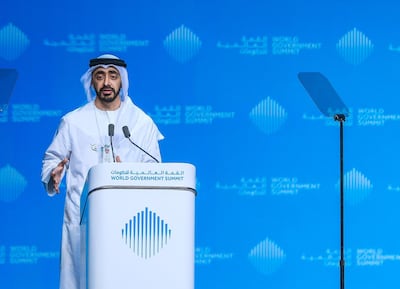Sheikh Abdullah bin Zayed, Minister of Foreign Affairs and International Co-operation, closed the first day of the World Government Summit on Sunday night with a call for religious tolerance and a warning that countries must stand up to all forms of extremism.
He announced that, starting from next year, the Human Fraternity Document – signed by Pope Francis and the Grand Imam of Al Azhar during their visit to the UAE last week – will be a part of the educational curriculum in schools and universities.
The document calls on people across the globe to unite to bring about inter-faith harmony and achieve peace.
On an opening day that heard concerns over the rise of populism and divisions driven by poverty and injustice, Sheikh Abdullah also urged governments and their people to ensure dialogue between faiths is open.
“We must find the courage to fight extremism in all its forms," he told hundreds of attendees at the summit at the Madinat Jumeirah complex in Dubai.
“We have to stand by these principles and this historical declaration is a goal for brotherhood, peace and fraternity among all believers and non-believers - between all those who have goodwill.
“Peace is not a condition for believers only, it is for all people.”
During the first day of the three-day summit, people also heard from Lebanese Prime Minister Saad Hariri, who said his new government must fight endemic corruption and economic crisis, and from Pakistan's Prime Minister Imran Khan, who outlined the need for "painful" reforms and to welcome investors and tourists to his debt-laden country.
In his speech, Sheikh Abdullah also referenced a survey on religious perception in Europe and the Arab world that he said was examined ahead of Pope Francis' visit to the Gulf last week.
He said it found 47 per cent of people interviewed in Europe found conflict between Islam and the values of European societies.
It also found that 25 per cent of those surveyed in Arab countries found Christianity was in conflict with the values of the Arab world, he said. And that results showed 72 per cent of Europeans and 54 per cent of Arabs were worried about increasing violence.
“This shows us there is a real problem,” he said.
Sheikh Abdullah said the Zayed International Fund for Co-existence announced last week will financially support initiatives that fulfill the points outlined in the Human Fraternity Document.
A training programme to educate teachers to become messengers of peace and reduce tensions in communities to lead people away from violence will also be developed, he said.
“We cannot say religion is the cause of this problem. It never encourages violence but it is used to justify violence and extremism," he said.
“It has been distorted throughout history. Freedom of race, colour and religion is a right for all."
His remarks followed a short video message from Pope Francis that called on religious leaders to learn lessons from history.
Sheikh Abdullah said Pope Francis’s meeting with Dr Ahmad Al Tayeb, Grand Imam of Al Azhar, Islam's most prestigious seat of learning, has opened a new page in the history of religious dialogue.
“This peace will fulfill responsibilities of religious leaders and politicians, therefore all of us should be gracious enough to assume our responsibilities to put an end to conflict and wars - we must try hard to do this,” he said.
“We may not succeed, but we will most definitely try with goodwill to learn from the mistakes of history.
“Peace is difficult to achieve, but it is not impossible.
“When we read in history, those who have made war are either politicians or religious leaders.
“This is why we wanted to achieve this peace.”
His closing speech topped a series of dialogue between government leaders and ministers where a common theme emerged: preparation for rapid technological growth, and a need to step up efforts to achieve the 17 sustainable development goals laid down by the United Nations before 2030.























